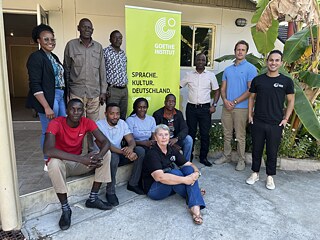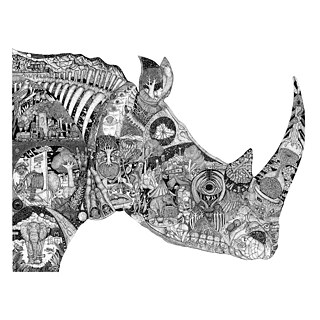Arts x Nature
Harnessing the transformative power of the arts is at the heart of the Goethe-Institut Namibia's pioneering efforts. Art, with its capacity to transcend barriers, ignite emotions, and inspire action, becomes a potent tool in our joint conservation initiatives. By integrating arts (film, design, drama) into conservation endeavors, the Goethe-Institut Namibia fosters a deeper connection with nature among the public, instilling a profound sense of responsibility and care for the environment.
Painting a Sustainable Future Together
Art & Conservation

Design thinking and behavioral interventions in combination with the arts are part of the solution and brings a different kind of magic. Art speaks where words fail, touches emotions, and drives change. By weaving art into conservation, we build a deeper bond with nature and motivate positive actions. It's this vision that united Goethe-Institut Namibia and the World Wildlife Fund (WWF) in a pioneering initiative, taking root in Namibia's Zambesi Region.
Behaviorial Intervention Training (BIT) tackles human wildlife conflict in Zambezi Region
From 7 to 9 August we ran our first BIT workshop in Zambezi region, Namibia. Here’s some background about our Behavioural Intervention Training (BIT) Project: human behavior stands out as a challenge in environmental conservation from human actions to habitat destruction to conflict with wildlife. Thus, to ensure more conservation success, a change is needed to promote better individual and societal choices. With this second phase, the aim was to guide the participating participants through the process in a more practical sense. Participants were requested to nominate a project; identify challenges and ideate potential solutions for those challenges by applying the behavioral intervention & design thinking to. It also included visits to three sites where projects were implemented that have not reached their desired impact and the aim of this was to assess where it might have gone wrong and where the BIT tools could have been applied to have a better outcome. With the solutions generated, they will now develop those further and combine it with the use of art and media (film, music, drama, design) to test with target groups.
Creative Education on Namibia's Human-Wildlife Conflict
Wild Kids Academy (Katima Mulilo) and Goethe-Institut Namibia join forces in environmental education!
Unique landscapes, rare bird species, lush greenery: the Zambezi Region in Namibia is an enchanting and ecologically diverse landscape with a wealth of natural resources. In short, it serves as a "food basket" for the region—for both humans and animals. However, as more people inhabit the region, human-wildlife conflicts become more frequent. Animals like elephants destroy valuable crops and sometimes kill livestock crucial for the survival of the local population.
To address these issues, the Wild Kids Academy in Katima Mulilo, with the support of the Goethe-Institut Namibia, organized the first "Environmental Awareness Day" in November. The goal was to demonstrate ways in which the interests of humans and animals can be harmonized. In addition to exhibition booths, the students presented a captivating musical play and a beautiful brochure highlighting potential conflicts between humans and wildlife. Furthermore, films were screened as part of the Science Film Festival. The festival included international films on current topics in the fields of ecology, technology, and research; 16 films from Namibia participated in the festival.
Science Film Festival 2023
The Science Film Festival (SSF) returned to Namibia and took place in Namibia’s coastal town of Swakopmund with its partner Scientific Society Swakopmund. Additionally, for the first time, the SFF was hosted in Katima Mulilo, the far Northern region of the country, in partnership with Wild Kids Academy - a private school focused on conservation. The festival featured international films that covered current topics in the fields of ecology, technology, and research. Notably, 16 films from Namibia participated in the festival.
